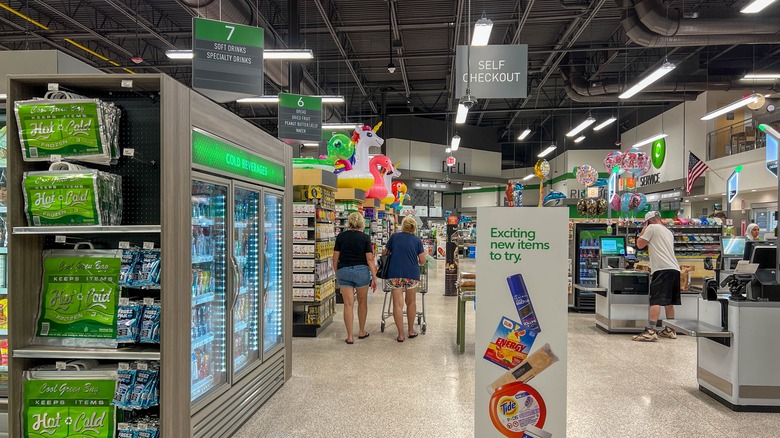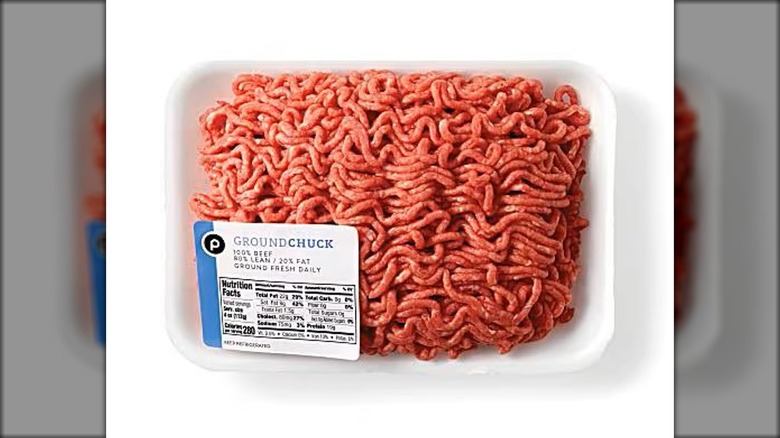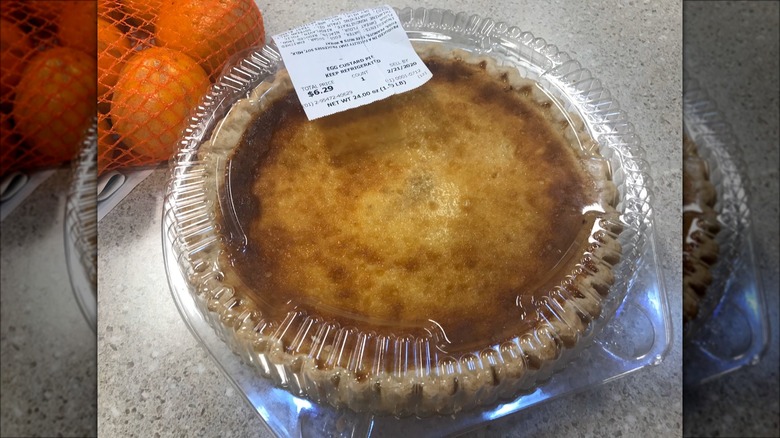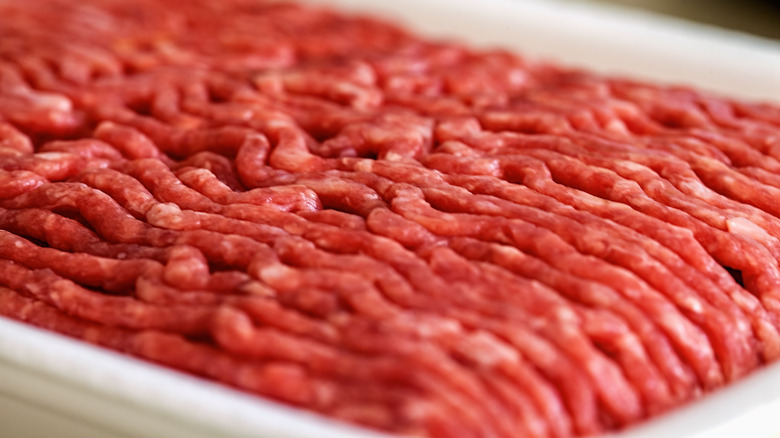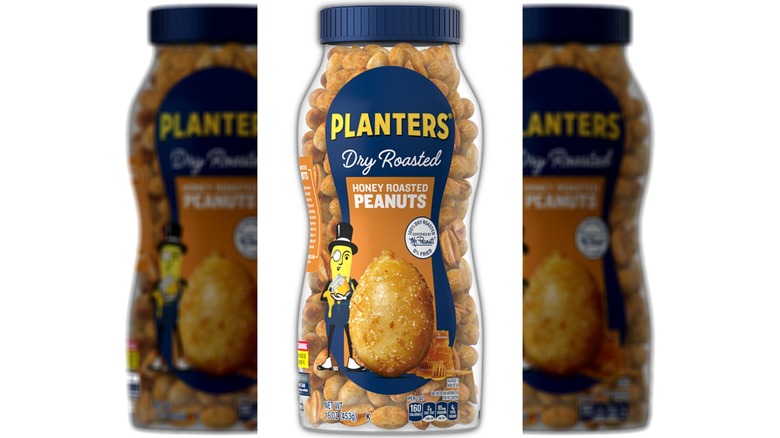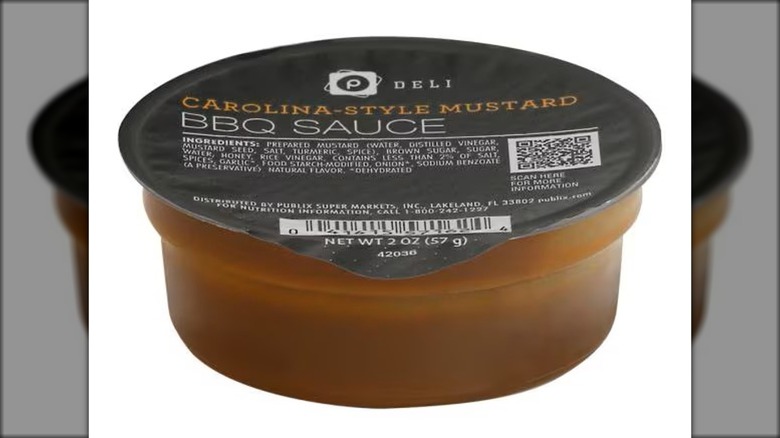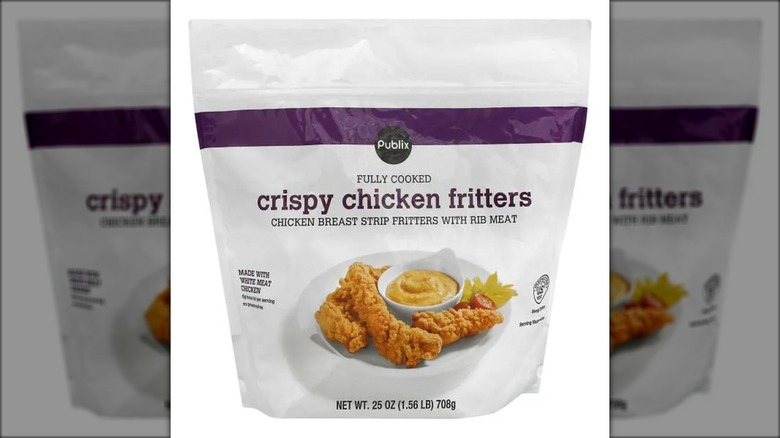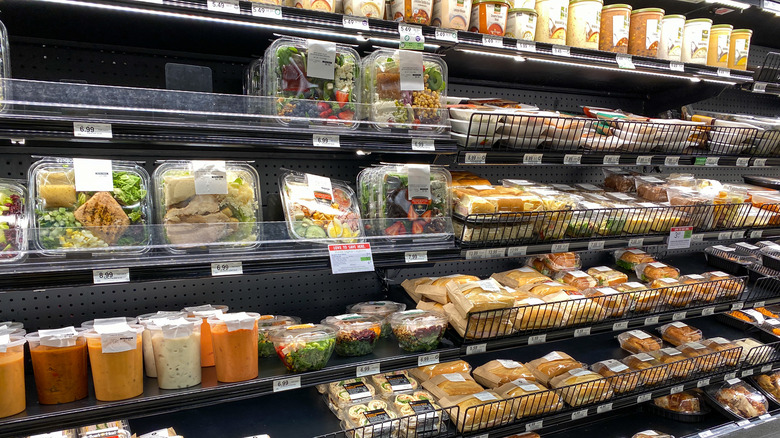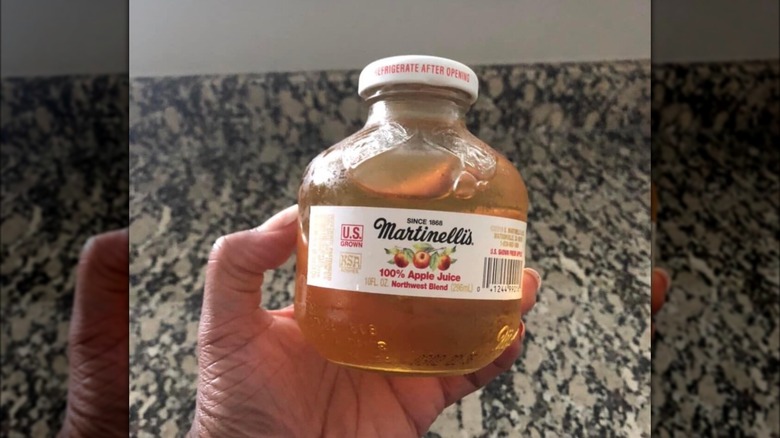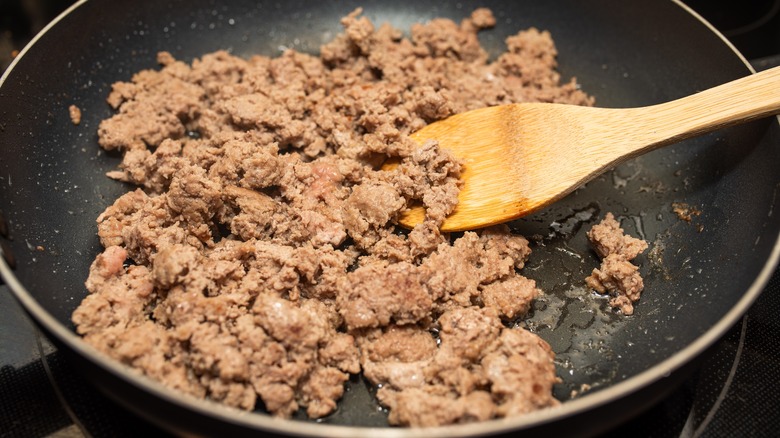14 Food Recalls That Will Always Haunt Publix
With over 1,300 locations dotted around the southern United States, Publix is one of the smaller grocery store chains out there. But this doesn't stop it from competing with brands that boast more locations, such as Aldi. In fact, Publix's middling size actually has a great many benefits, the most obvious being that it can react quicker than mega-chains like Walmart or Kroger. This is especially important given that Publix, like most other grocery stores, is currently facing an almost unprecedented number of product recalls.
Publix goes to great lengths to mitigate the impact of faulty foods sold at its stores. The company closely inspects recall announcements and swiftly shares info about any that pertain to its products. Team members also do a great job of removing the offending products from shelves. Despite these measures, Publix has still been embroiled in several food recalls that have left its consumer base sickened, alarmed, and disappointed. In this article, we highlight 14 of the most haunting.
1. Ground chuck recalled over E. coli concerns
In August 2018, the Food Safety and Inspection Service revealed that Publix was voluntarily recalling several products that contained ground chuck over concerns the meat had been contaminated with E. coli O26 bacteria. These products, which included hamburgers, meatballs, and meatloaf, were sold during the latter days of June and the entirety of July in Publix stores located across 24 Florida counties.
Despite Publix issuing a recall for these products, 18 people were reported as falling ill due to eating the tainted meat. Some of these illnesses likely arose because only a small amount of the tainted food was recovered: The FSIS reported that just over 100 pounds of faulty food was officially retrieved, which was sure to be a fraction of the total amount sold.
Illnesses associated with this specific strain of E. coli are decidedly unpleasant, with symptoms including vomiting, bloody diarrhea, and abdominal pain. In some circumstances, infections from this bacterium can also lead to a kind of kidney failure called hemolytic uremic syndrome. Fortunately, there were no reports of hemolytic uremic syndrome occurring as part of this specific outbreak.
2. Egg custard pie recalled over undeclared allergen
November 2023 saw Publix issue a recall of a popular egg custard pie in stores located across four Florida counties: Monroe, Miami-Dade, Broward, and Palm Beach. This recall was issued after it was discovered that the brand's coconut pies had accidentally been packed in egg custard pie boxes, meaning all of the listed nutritional information was incorrect.
Of most concern was the undeclared presence of coconut itself, an allergen that can cause severe reactions in those vulnerable. Symptoms of these reactions range from mild irritation to nausea, vomiting, and even life-threatening anaphylaxis. Once Publix realized its mistake, the company moved quickly, removing the faulty pies from all of the affected stores. Customers were also encouraged to take the product back to stores where they would receive a full refund.
Thankfully, this prompt action meant there were no illnesses or allergic reactions reported in conjunction with Publix's egg custard pie recall. However, that such a basic error occurred brings into question the rigor of quality control standards that are in place at some Publix stores.
3. Ground meat recalled due to foreign contaminants on two occasions
In 2024, Publix issued two separate recalls for ground beef products over concerns they had been contaminated with foreign objects. The first of these recalls came in February when a single Publix store located in Spring Hill, Florida recalled 11 products, including burgers and ground chuck. It was not specified what foreign material was present in the recalled products nor how the grocery store chain became aware of its presence in the ground meat. Just a few months later in June, Publix issued another recall for ground beef, this time at one of its stores in Alpharetta, Georgia. Again, this recall was due to undisclosed foreign contaminants being present in the ground beef.
Whatever the foreign material was on these two occasions, it posed a serious health risk to customers. Not only can pieces of bone, plastic, or metal cause damage to unsuspecting customers' mouths and teeth, smaller fragments also pose a choking hazard. Thankfully, both of these recalls were successfully executed without there being reports of injury or illness. However, many customers will continue to be wary of Publix's ground meat — and for good reason.
4. Baby arugula recalled due to Salmonella concerns
In June 2024, Green Life Farms issued a recall for a single lot of baby arugula found during routine testing to be contaminated with Salmonella bacteria. If ingested, Salmonella bacteria can cause salmonellosis, an illness that produces various symptoms including nausea, vomiting, and stomach pain. The contaminated lot of affected baby arugula was only distributed to Publix stores, which made the recall that much easier to effectively execute, although it did invite a lot of criticism of Publix and the safety of its products.
Both Publix and Green Life Farms acted promptly after the testing results came in. Publix pulled all of the potentially contaminated products from the shelves of the affected stores, and Green Life Farms worked to ascertain whether other lots of arugula were also contaminated. As a result of this impressive work, no illnesses were linked with the contaminated batch of arugula, marking this a successful and effective recall.
5. Nuts recalled due to contamination with Listeria
In May 2024, Hormel Foods, one of the biggest food companies in the United States, issued a recall for two products sold under the Planter's brand: honey roasted peanuts and lightly salted mixed nuts. Both of these products were recalled over concerns they had been contaminated with Listeria monocytogenes bacteria.
Eating food contaminated with Listeria monocytogenes can lead to listeriosis, an illness that sickens some 1,600 Americans per year. Symptoms range from headaches to fatigue, and some invasive forms of the illness can even be fatal. Pregnant people and their unborn children are most at risk of contracting listeriosis, although elderly people and those with weakened immune systems are also prone to aggressive forms of the illness. All told, over 250 Americans die of listeriosis every year.
Both of the contaminated Planter's products were distributed to Publix locations in Florida, Georgia, Alabama, and North Carolina. Several Dollar Tree locations were also included in the recall. Thankfully, no illnesses were reported in conjunction with the recalled products. However, the recall of such a popular food due to contamination with a bacteria as harmful as Listeria monocytogenes did nothing to improve Publix's already dire food safety reputation.
6. Barbecue sauce recalled due to undeclared allergen
Another recall Publix endured during the first half of 2024 involved its Carolina-style mustard BBQ sauce. This product, which was manufactured by Ventura Foods, was pulled from shelves in January, when it was found to contain an undeclared allergen. The allergen in question was anchovy, meaning that any customers who suffered from a fish allergy were at risk of illness if they consumed the mislabeled product.
Publix recalled the barbecue sauce from all its stores across seven states: Alabama, Florida, Georgia, North Carolina, South Carolina, Tennessee, and Virginia. This amounted to a whopping 1,360 grocery stores. Only one Publix store, located in Kentucky, was not involved in the recall. Despite the huge number of stores involved in the recall, no illnesses or allergic reactions were associated with the recalled product. This marks another lucky escape for Publix in what swiftly became a recall-ridden year.
7. Spinach recalled due to potential Listeria contamination
Fresh Express, a salad supplier that's been embroiled in some of Aldi's most haunting food recalls, issued another recall during December 2023. This one pertained to two of the company's spinach products, which were distributed to various retailers, including Publix. The spinach was recalled after a random test carried out by the Florida Department of Agriculture found a bag of Fresh Express spinach to be carrying Listeria monocytogenes bacteria.
Publix pulled the Fresh Express spinach from stores in seven states: Alabama, Florida, Georgia, North Carolina, South Carolina, Tennessee, and Virginia. It also advised customers who bought the spinach to dispose of it themselves or bring it back to the store for a refund. These steps evidently worked: There were no illnesses associated with the contaminated spinach despite raw leafy greens being an extremely high risk item. While bodily harm was avoided, this recall once again contributed to Publix's poor food safety reputation.
8. Chicken strips recalled due to metal contaminants
In March 2019, food manufacturing company Tyson Foods issued a recall of over 69,000 pounds of frozen chicken strips after two customers complained they'd found pieces of metal in the food. Initially, the company stated this was an isolated incident and the only products that had been recalled were produced in the same facility in Arkansas on the same day. Hopes that this would remain a contained recall were scuppered when a further four customers found metal in chicken products produced by Tyson Foods. All in all, three individuals suffered oral injuries as a result of the faulty food. It is not known if the products which caused injuries were sold by Publix stores.
What followed was a recall on an enormous scale. Tyson Foods recalled a further 11,760,424 pounds of its chicken products, affecting a huge number of grocery store brands and even organizations such as the Department for Defense. It was confirmed that these chicken strips were produced in the same factory as those involved in the smaller initial recall. Publix stores were affected in six states: Alabama, Georgia, North Carolina, South Carolina, Tennessee, and Virginia.
9. Fruit and grain salad recalled due to Listeria contamination
Publix had another Listeria monocytogenes scare in April 2013 when the grocery store brand pulled its deli fruit and grain salad from stores in Alabama, Florida, Georgia, South Carolina, and Tennessee amid concerns it was contaminated with the bacteria. This recall was issued after one of Publix's suppliers, Allison's Gourmet Kitchens, told the company that the product might be contaminated. This stood as another food safety scare that rocked customers' trust in the chain.
Temperatures around 165 degrees Fahrenheit have been shown to kill Listeria bacteria, thus making a piece of contaminated food safe to eat. As a ready-to-eat product, Publix's fruit and grain salad would most likely not be heated to anything near 165 degrees Fahrenheit and thus posed a very real risk to customers. This makes it all the more surprising that there were no illnesses associated with the recalled product.
10. Stone fruit recalled over Listeria concerns
Perhaps the most haunting of all food recalls Publix has been involved in came during November 2023 when HMC Farms issued a recall for stone fruit that it'd distributed to retailers during the summer of both 2022 and 2023. It had been discovered that the peaches, plums, and nectarines distributed by this supplier and sold by major grocery store brands, including both Publix and Walmart, had been the cause of an ongoing Listeria outbreak that had sickened at least 11 people across seven states. Of these, 10 individuals were hospitalized with listeriosis. Unfortunately, one person passed away as a result of their illness.
What made this recall all the more difficult to process is that it came far too late to have much of an impact. The fruit was only found to be the source of the outbreak long after it'd been sold to the public. As such, the recall's only concrete goal was to alert those few individuals who might have frozen the fruit for later. All told, the whole episode left a bad taste in many peoples' mouths.
11. Apple juice recalled due to high arsenic levels
While dangerous bacteria and fragments of inedible materials form the basis of most food recalls, they're not the only, nor the most alarming, cause. This was highlighted in May 2024 when shoppers learned 25,000 cases of Martinelli's apple juice were being recalled from stores due to high levels of arsenic.
As many people know, arsenic is an incredibly toxic heavy metal. The metal has been used as a deadly poison for centuries. It's even dangerous in small amounts, and has been linked with cancer, diabetes, and cardiovascular issues. For these reasons, arsenic has a fearsome reputation, and the discovery that arsenic levels in Martinelli's apple juice were higher than the Food and Drug Administration's recommended level of 10 parts per billion understandably led some people to panic.
The apple juice was pulled from Kroger, Publix, Target, Winn-Dixie, and Whole Foods stores across the country. There were no illnesses or adverse effects linked with the product. However, the fact that Publix and other retail brands sold arsenic-tainted apple juice rocked people's trust in both the supplier and the stores which sold the product.
12. Bagged vegetables recalled amid Listeria concerns
Publix underwent yet another Listeria-driven food recall in January 2021 when the company recalled its steam-in-bag vegetable products. This recall was initiated after Race-West Company notified Pero Family Farms, one of Publix's suppliers, that the butternut squash used in the products may have been contaminated with Listeria monocytogenes bacteria.
In a statement recorded by Food Manufacturing, Publix communications director Maria Brous said, "As part of our commitment to food safety, potentially impacted product has been removed from all store shelves ... Consumers who have purchased the products in question may return the product to their local store for a full refund."
No cases of listeriosis occurred as a result of people eating Publix's steam-in-bag vegetable products. Regardless, this recall added further proof that Publix has failed to get a hold on the safety of its food, especially when it pertains to produce contaminated with Listeria.
13. Basil recalled due to cyclospora outbreak
In July 2019, it was revealed that a cyclospora outbreak had sickened 132 people located in 11 states. Of these, four individuals required hospitalization. As a harmful parasite, cyclospora causes several unsavory symptoms including nausea, stomach pain, and diarrhea. These symptoms can last a long time and come and go, making it especially debilitating for those who contract it.
This particular outbreak was traced to basil that'd been grown in Mexico and was distributed by Siga Logistics to grocery stores and restaurants around the nation. Publix issued a recall of its own, withdrawing six lots of its Rock Garden basil products from its stores. However, these actions — and similar ones undertaken by other companies and brands — were not enough to prevent a large number of Americans falling ill.
Aside from selling products that could have sickened people, Publix's reputation was damaged due to the nature of cyclospora. This parasite is only found when food comes into contact with contaminated feces. This disgusting fact is anything but a good look for Publix.
14. Ground turkey recalled over metal contaminants
Over the years, Publix has gained a reputation for selling ground meat containing inedible foreign contaminants. In October 2017, this reputation spread from the chain's ground beef to its ground turkey. Prestage Foods, one of Publix's suppliers, recalled just under 40,000 pounds of ground turkey due to contamination by metal shavings. The food was first discovered to be faulty by a retailer who noticed metal amongst the meat. Employees who were cleaning the processing equipment also informed the authorities that contamination might have taken place.
While no injuries, oral or otherwise, were reported in conjunction with the ground turkey, Publix's reputation was damaged by the recall. Other grocery store brands that were included in the recall, such as Aldi, also took a blow, but these brands have not been embroiled in the huge number of meat-based recalls Publix has.
